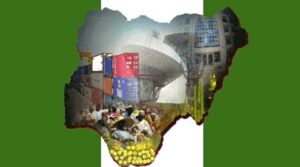

Enough is enough: Food palliative is not the answer, fix the economy
The recent incident that happened where two students of Nasarawa State University Keffi (NSUK), died while 17 others sustained various degrees of injuries in a stampede that occurred during the distribution of palliatives in the school is an avoidable tragedy.
A glimpse at the short video which has since gone viral showed how thousands of students forcefully broke into the venue of the palliative distribution where the two undergraduates died of suspected asphyxiation.
Recall that Nasarawa state Governor, Abdullahi Sule, launched the distribution of palliative — a 7.5kg bag of rice and N5,000 — to students of tertiary institutions and other beneficiaries in the state.
The palliative, though insignificant, has provided, even if temporarily, some form of relief to students and others fortunate enough to get it.
The distribution went on seamlessly in Federal University of Lafia, Isa Mustapha Agwai Polytechnic Lafia, College of Agriculture, Science and Technology, Lafia, as well as the School of Nursing and Midwifery Lafia. How come the distribution in NSUK ended on such a tragic note?
A nagging question since the tragedy occurred has to do with the arrangement for the distribution of the items. Reports indicate that there were not-too-tidy arrangements and many are holding the management of NSUK complicit as far as the alleged shoddy distribution process was concerned.
In saner climes, some persons would have resigned and turned themselves in for prosecution. But this is Nigeria where public officials are hardly made to account for their actions.
The video of thousands of NSUK students forcing themselves into the venue of the distribution showed clearly that those saddled with the responsibility of distributing the material did a poor job of arranging for the exercise. Not only did they fail to learn from the tragedy that occurred during a similar exercise by the Nigerian Customs Service, where seven precious lives were lost, they failed also, to learn from how other tertiary institutions in the state handled the exercise.
The tragedy has thrown up numerous questions that only the university management can answer. But whether or not they provide satisfactory answers to the circumstances that led to the death of the students, it is obvious that their families have been thrown into mourning with some dreams needlessly cut short.
While we mourn those who died and sympathise with those receiving treatment at different hospitals, we demand that there be a thorough investigation into the circumstances surrounding this needless death. Those found culpable should be made to face the full wrath of the law.
Considering the fact that some people might be held derelict in the performance of their duties that would otherwise have saved those lives, we are also persuaded to argue that the incident was as a result of man-made error that must not go unpunished. Without any equivocation, we make bold to demand that adequate compensation be paid to all those directly affected by this tragedy.
More than anything else, this tragic occurrence reminds us yet one more time, how leadership failure has brought us into this dire strait. As a matter of fact, Nigerians are trapped in a hunger strait of gargantuan magnitude which has engendered such a struggle for food by students of tertiary institutions.
This situation is possible because successive administrations, especially the one in the last eight years, failed woefully in making farms safe for farmers.
With indignation, Nigerians lament as security of lives and property which remained the major role of government, became so perilous that farmers were forced by non-state actors, to abandon their farmlands. And to make matters worse, the government remained obdurate in implementing some International Monetary Fund and World Bank- supported economic policies that are gradually eroding the citizens’ economic power.
The way out of the current mess is for the government to ensure that farmers are safe and supported with modern farm implementations to return to farms. Also, there is the need to critically assess some economic policy recommendations from the Bretton Woods institutions.
However, we must not fail to point out the unruly behaviour of the students that border on crass indiscipline. If they had conducted themselves in an orderly manner, maybe the tragedy would have been averted.
‘Stomach infrastructure’ is a reality projected by the Nigerian politicians on the vulnerable electorate who, for poverty, are encouraged to mortgage their fundamental right of freedom to choose who governs them in exchange for immediate gratification.
Recently, what we call politics in Nigeria has turned towards the base satisfaction of people’s needs. Money and food items have become the inducement to disrupt the electorate’s voting preferences. And with rampant poverty in Nigeria, it does not take serious reflection to see how people can be swayed to vote against their conscience with mere thousands of naira and a bag of rice.
A careful observation will reveal that politicians have started handing over to Nigerians the dividends of democracy in cash by exploiting poverty to mobilise voters with food items such as bags of rice and money. The bags of rice are usually packaged strategically with the image of political candidates and the parties they represent.
All stakeholders, labour leaders, monarchs, international communities and decision makers should join hands and rise against food palliatives as the major barricade against poverty and hunger sweeping the country. The Governors should focus on providing Agricultural loans, vocational skills empowerment to the indigenous people, providing education for the masses than resorting cheaply to palliatives. Enough is enough.




